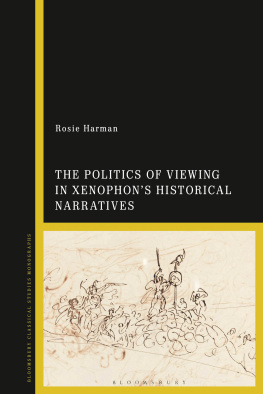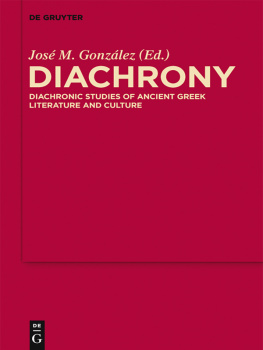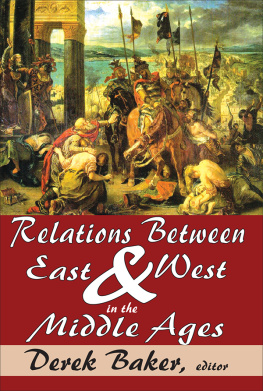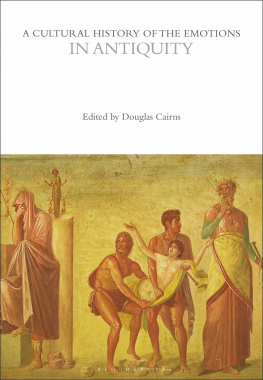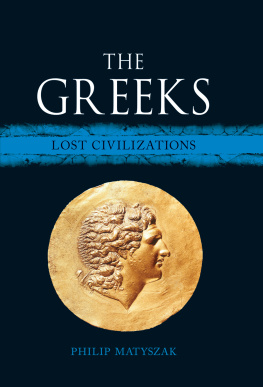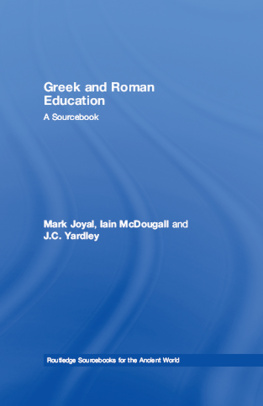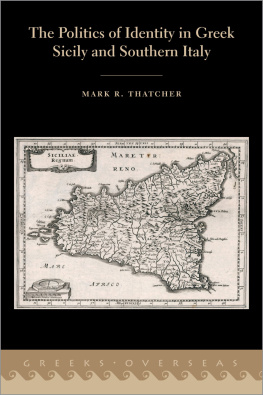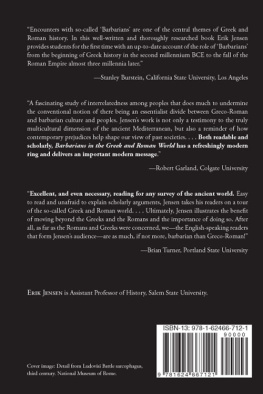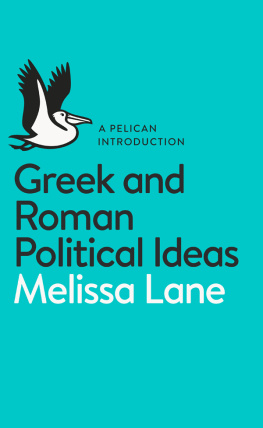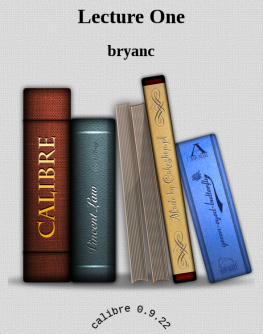
GREEK AND GREEKNESS: VIEWING THE GREEK PAST UNDER THE ROMAN EMPIRE
Karl Marx observed that just when people seem engaged in revolutionising themselves, they anxiously conjure up the spirits of the past to their service. While the Greek east under Roman rule was not revolutionary, perhaps, in the sense that Marx had in mind, it was engaged in creating something that had not previously existed, in part just through the millennia-long involvement with its own tradition, which was continually being remodelled and readapted. It was an age that was intensely self-conscious about its relation to history, a consciousness that manifested itself not only in Attic purism and a reverence for antique literary models but also in ethnic identities, educational and religious institutions, and political interactions with and even among the Romans. In this volume, which represents a selection of the papers presented at the colloquium, Greeks on Greekness: The Construction and Uses of the Greek Past among Greeks under the Roman Empire, held at the Center for Hellenic Studies on 2528 August 2001, seven scholars explore some of the forms that this preoccupation with the Greek past assumed under Roman rule. Taken together, the chapters in this volume offer a kaleidoscopic view of how Greeks under the Roman Empire related to their past, indicating the multiple ways in which the classical tradition was problematised, adapted, transformed and at times rejected. They thus provide a vivid image of a lived relation to tradition, one that was inventive rather than conservative and selfconscious rather than passive. The Greeks under Rome played with their heritage, as they played at being and not being the Greeks they continually studied and remembered.
DAVID KONSTAN is John Rowe Workman Distinguished Professor of Classics and the Humanistic Tradition and Professor of Comparative Literature at Brown University.
SUZANNE SAD is Professor of Classics at Columbia University.
CAMBRIDGE CLASSICAL JOURNAL
PROCEEDINGS OF THE CAMBRIDGE PHILOLOGICAL SOCIETY
SUPPLEMENTARY VOLUME 29
Editors
TIM WHITMARSH, CHRISTOPHER KELLY, JAMES WARREN
GREEKS ON GREEKNESS
VIEWING THE GREEK PAST UNDER THE ROMAN EMPIRE
DAVID KONSTAN AND SUZANNE SAD
Published by The Cambridge Philological Society.
www.classics.cam.ac.uk/pcps/pcpshome.html
The Cambridge Philological Society, 2006
ISBN 978 0 906014 28 8
This book is available direct from Oxbow Books, Park End Place, Oxford, OX 1 1HN.
www.oxbowbooks.com
Printed by Cambridge University Press.
www.cambridge.org/printing
CONTENTS
David Konstan
Tony Spawforth
Ruth Webb
Suzanne Said
Ewen Bowie
Tim Whitmarsh
Simon Goldhill
Greg Woolf
CONTRIBUTORS
Ewen Bowie has been E. P. Warren Praelector in Classics at Corpus Christi College Oxford since 1965 and is Professor of Classical Languages and Literature at the University of Oxford. He has written numerous articles and chapters for co-authored volumes on Greek literature and society in the Roman Empire, and on archaic and Hellenistic Greek poetry. He is completing a commentary on Longus, Daphnis and Chloe, and (with Js Elsner) is editing and contributing to a book on Philostratus.
Simon Goldhill is Professor of Greek at Cambridge University and a fellow of Kings College. His most recent books are Who needs Greek? Contests in the cultural history of Hellenism (Cambridge, 2002); Love, sex and tragedy: how the ancient world shapes modern life (Chicago, 2004); and The Temple of Jerusalem (London, 2004).
David Konstan is the John Rowe Workman Distinguished Professor of Classics and Professor of Comparative Literature at Brown University. He was President of the American Philological Association in 1999. Among his publications are Roman comedy (Ithaca, 1983), Sexual symmetry: love in the ancient novel and related genres (Princeton, 1994), Greek comedy and ideology (Oxford, 1995), Friendship in the classical world (Cambridge, 1997), and Pity transformed (London, 2001). His book on The emotions of the ancient Greeks is in press.
Suzanne Sad is Professor of Classics at Columbia University. She has edited Hellenismos: quelques jalons pour une histoire de lidentit grecque (Leiden, 1989) and published numerous articles on Greek literature (from Homer to Heliodorus) and its reception. Among her books are La faute tragique (Paris, 1978), Sophiste et Tyran ou le problme du Promthe enchan (Paris 1985), Histoire de la littrature grecque (with M. Trd and A. Le Boulluec: Paris, 1997), Approches de la mythologie grecque (Paris, 1998), and Homre et lOdysse (Paris, 1998).
Antony Spawforth is Professor of Ancient History at the University of Newcastle upon Tyne. He has recently written a book on Greek temples (The complete temples of the ancient Greeks, London, 2005) and edited and contributed to a book on aulic history (The court and court society in ancient monarchies, forthcoming). He is currently working on a book on Rome and Greece.
Ruth Webb is currently Honorary Research Fellow in the School of History, Classics and Archaeology of Birkbeck College, London. The preliminary research for this article was undertaken while she was Assistant Professor of Post-classical Greek at Princeton University, and with support from the Center for Hellenic Studies. She has published numerous articles on rhetorical theory and practice, on ekphrasis and enargeia, and on performance in the Imperial Period and Late Antiquity. She is currently completing a book on The late antique theatre and its critics for Harvard University Press.
Tim Whitmarsh is Professor of Ancient Literatures at the University of Exeter. He is the author of Greek literature and the Roman empire (Oxford, 2001), Ancient Greek literature (Cambridge, 2004) and The Second Sophistic (Oxford, 2005). His forthcoming book is provisionally titled Reading the self in the ancient Greek novel (Cambridge).
Greg Woolf has been Professor of Ancient History at the University of St. Andrews since 1998, until when he held a series of fellowships at various Oxford and Cambridge colleges. He is the author of Becoming Roman: the origins of provincial civilisation in Gaul (Cambridge, 1998) and with Catharine Edwards recently co-edited Rome the Cosmopolis (Cambridge, 2003).
INTRODUCTION
Socrates (discussing performers of epic poetry): Can we say, Ion, that a man is in his right mind when, though he is adorned with embroidered robes and golden crowns, he weeps amidst sacrifices and festivals ? Ion: To tell the truth, Socrates, why no (Ion 535D)
Ion: I must pay strict attention to the audience, since if I make them cry, Ill laugh when I take their money, but if I make them laugh, Ill be crying at the money Ive lost (Ion 535E)
Ion: You speak well, Socrates, but Id be surprised if you could speak well enough to persuade me that I am possessed and mad when I laud Homer (Ion 536D)
Olivier is not Hamlet, but also not not Hamlet (Schechner (1985) 110, quoted in Webb below)
Actors and we may include among them the great orators, declaimers, rhapsodes and rhetoricians of classical antiquity have a complex relationship to the rles that they enact. On the one hand, they identify at least to some extent with the feelings and attitudes of the characters they play; on the other hand, they do not do so to the extent of merging entirely with the persona were this to occur, they would be raving, not acting.


